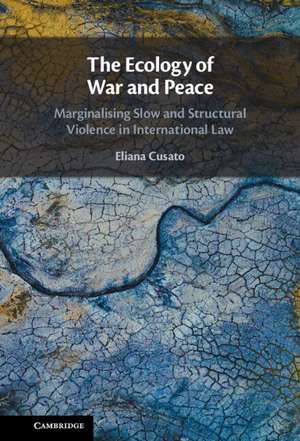The Ecology of War and Peace: Marginalising Slow and Structural Violence in International Law
Autor Eliana Cusatoen Limba Engleză Hardback – 15 sep 2021
| Toate formatele și edițiile | Preț | Express |
|---|---|---|
| Paperback (1) | 230.73 lei 3-5 săpt. | +17.14 lei 7-13 zile |
| Cambridge University Press – 4 iul 2024 | 230.73 lei 3-5 săpt. | +17.14 lei 7-13 zile |
| Hardback (1) | 726.74 lei 6-8 săpt. | |
| Cambridge University Press – 15 sep 2021 | 726.74 lei 6-8 săpt. |
Preț: 726.74 lei
Preț vechi: 845.04 lei
-14% Nou
Puncte Express: 1090
Preț estimativ în valută:
139.06€ • 144.91$ • 115.14£
139.06€ • 144.91$ • 115.14£
Carte tipărită la comandă
Livrare economică 03-17 aprilie
Preluare comenzi: 021 569.72.76
Specificații
ISBN-13: 9781108837521
ISBN-10: 1108837522
Pagini: 312
Dimensiuni: 159 x 235 x 22 mm
Greutate: 0.58 kg
Editura: Cambridge University Press
Colecția Cambridge University Press
Locul publicării:Cambridge, United Kingdom
ISBN-10: 1108837522
Pagini: 312
Dimensiuni: 159 x 235 x 22 mm
Greutate: 0.58 kg
Editura: Cambridge University Press
Colecția Cambridge University Press
Locul publicării:Cambridge, United Kingdom
Cuprins
1. Introduction: international law, violence and visibility; Part I: Concepts, Theories, and Debates: 2. The ecology of war and peace: unpacking the assumptions; 3. Origins and evolutions of legal debates on the environment-conflict 'nexus'; Part II: The Practice of International Law: 4. War crimes tribunals and the International Court of Justice: nature between property protection and humanitarian concerns; 5. The United Nations Security Council: from 'conflict resources' to climate change as a 'threat' to international peace and security; 6. Truth commissions: conflicts over extractive resources and the battle for different views of nature; 7. Conclusion: towards a political ecology of international law.
Recenzii
'This book lucidly analyses how international law regulates and often exacerbates the 'slow violence' of ecological damage. Eliana Cusato unravels the interconnectedness of conflict and environmental destruction, exploring the tensions between the values of militarism and warfare on the one hand and ecological sustainability on the other. The book is startling and important, calling for a reframing of the relationship between conflict and the natural world.' Hilary Charlesworth, Melbourne Law School
'Eliana Cusato's illuminating book demonstrates the impoverished and limited ways in which existing international law protects the environment in conflict. In revealing and exploring these inadequacies, Cusato provides us with a compelling account of the work that needs to be done if we are to address the many challenges arising from the complex relationship between the environment and conflict. Deeply researched, richly inter-disciplinary in its approach and written with impressive clarity, this is a valuable and urgently needed book.' Antony Anghie, National University of Singapore and University of Utah
'Dr Cusato is cleared eyed about the complexity and difficulties involved in formulating a legal regime when some of the belligerents in intra-state conflicts are generally not constrained by formal rules of international law. The book offers profound inter-disciplinary insights and is candid in its conclusion that ultimately, here, lawyers don't have all the answers.' Phoebe Okowa, Professor of Public International Law, Queen Mary, University of London
'Eliana Cusato's illuminating book demonstrates the impoverished and limited ways in which existing international law protects the environment in conflict. In revealing and exploring these inadequacies, Cusato provides us with a compelling account of the work that needs to be done if we are to address the many challenges arising from the complex relationship between the environment and conflict. Deeply researched, richly inter-disciplinary in its approach and written with impressive clarity, this is a valuable and urgently needed book.' Antony Anghie, National University of Singapore and University of Utah
'Dr Cusato is cleared eyed about the complexity and difficulties involved in formulating a legal regime when some of the belligerents in intra-state conflicts are generally not constrained by formal rules of international law. The book offers profound inter-disciplinary insights and is candid in its conclusion that ultimately, here, lawyers don't have all the answers.' Phoebe Okowa, Professor of Public International Law, Queen Mary, University of London
Notă biografică
Descriere
Unpacks key assumptions about the 'environment', its relationship with violent conflict, and the justification for its protection underlying international law.
